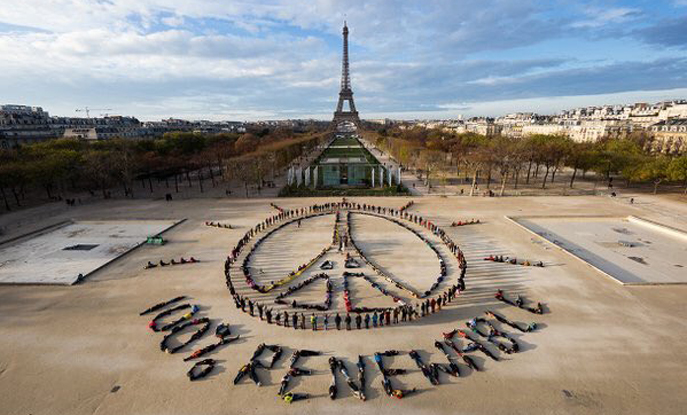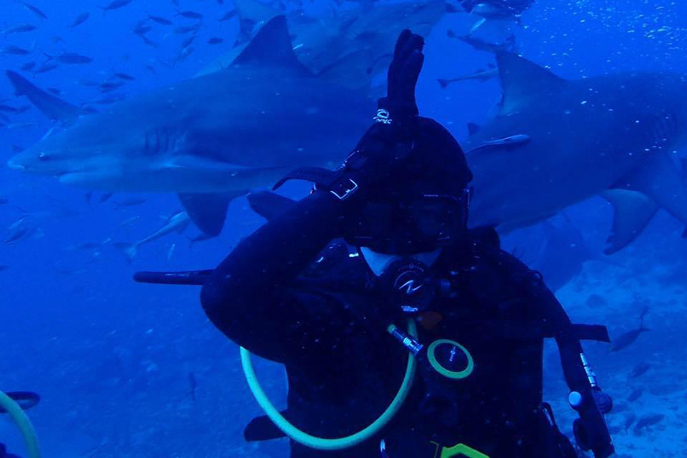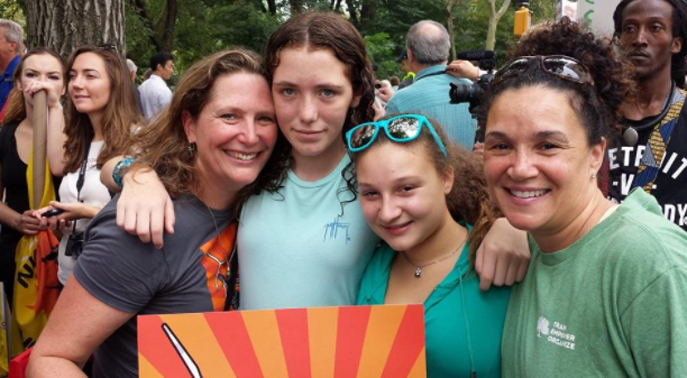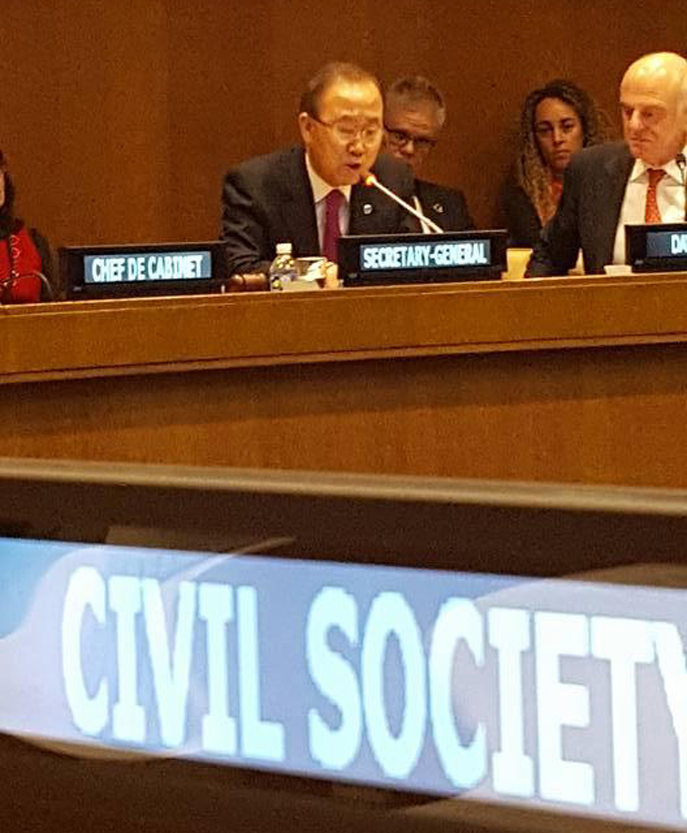
Paris Climate Summit, December 2015. (Loren is one of the dots in the peace sign.) Photo by Yann Arthus-Bertrand / Spectral Q.
###
My daughter Maya studied sharks in Fiji last summer. Her missives home emphasized that:
- Letting her dive with bull sharks was not a ridiculous parenting decision
- Sharks are terribly misunderstood and mistreated by humans
- Fiji is breathtakingly beautiful and vulnerable
- The Fijian people and their “Bula Spirit” are amazing!

Maya signing, “Shark!” in Fiji, July 2017. Photo by Ben Fishman.
Bula is short for “Ni sa bula vinaka,” which means “wishing you happiness and good health” in Fijian and is commonly used as an enthusiastic “Hello!” In a speech to the people of Fiji last week, Prime Minister Voreqe Bainimarama promised to bring the “Bula Spirit” to the 23rd annual “conference of the parties” (COP) of the United Nations Framework Convention on Climate Change that just got underway this week in Bonn, Germany.
While the conference is taking place in Bonn for logistical reasons, Fiji is the official host. The first island nation to lead a COP, it brings a powerful moral authority to the role. The country suffered $1billion in damages when Cyclone Winston—the most intense tropical cyclone on record in the southern hemisphere—struck last year. It has already had to relocate one village due to sea level rise, and in an act of “we’re all in this together” that other nations would do well to emulate, Fiji has committed to absorbing the entire populations of neighboring islands Tuvalu and Kiribati, which are expected to be inundated by rising seas.
Both the Bula Zone, where the official governmental negotiations are taking place, and the Bonn Zone, where non-governmental groups, subnational policy-makers, and businesses are gathering, feature Pacific cultural themes. An ocean-going canoe or “drua” in the main hall reminds us that, as Bainimarama put it, “We are all in the same canoe.” Fiji’s lead negotiator, Ambassador Nazhat Shameem Khan, will draw on talanoa, a Pacific tradition of informal storytelling that builds empathy and consensus for collective action. She will also emphasize the important role of women.
We are slowly coming to recognize the importance of giving those most affected by climate change the opportunity to tell their stories. At the same time, we’re coming to appreciate the importance of fully engaging the governmental officials of the Bula Zone as well as the local government and non-governmental participants of the Bonn Zone, at the COP and after everyone returns home.
I attended the first Earth Summit in Rio de Janiero in 1992. Discouraged by U.S. obstructionism in the official negotiations, I focused on the non-governmental organizations’ negotiations. Groups from developing countries worked to convince the big green groups from the North that environmental solutions must engage local people and truly address their needs.
It's taken a while, but the 2014 Climate March in New York City finally embraced this notion with its motto, “To Change Everything, We Need Everybody”, and representatives from front-line communities leading the march. The Sierra Club is internalizing this commitment with its Equity, Justice and Inclusion initiative.

Loren, Maya and friends at the 2014 Climate March in New York City. Photo by Susana Reyes.
Last November, I attended the announcement at the United Nations Secretariat as the Paris Accord went into effect in record time, less than a year after the agreement was reached. Then-Secretary General Ban Ki-Moon chose to celebrate with representatives of civil society, telling them, "You mobilized hundreds of millions of voices and made this international agreement possible.” He urged everyone present to “keep up the fight, hold governments accountable, and press for action." His words echoed the sentiment of those present in Paris as the famous agreement was reached in late 2015. But even at the height of the celebration, everyone knew the Paris targets were insufficient, and the real work of meeting and raising them would mainly fall to state and local actors and broader civil society.

Former UN Secretary General Ban Ki-Moon announcing the Paris Accord taking effect and emphasizing the role of civil society. November, 2016. Photo by Loren Blackford.
This truth became abundantly clear when, 72 hours after the Paris Accord went into effect, Donald Trump was elected president. Within six months, he had announced his intention to pull the U.S. out of the agreement, putting us in a category alone with Syria and abdicating our leadership in the world.
[News flash: On the second day of the COP in Bonn, Syria announced it is joining, so the United States will be the only country in the world not party to the Paris Accord!]
As Trump signaled his plan to withdraw, governors, mayors, CEOs, and university presidents stepped up to deride the decision and make their own commitments to the Paris targets and even more ambitious goals like the Sierra Club’s Ready for 100 campaign. Many of these leaders are traveling to Bonn to reaffirm their pledges and pressure their national governments for stronger action.
We need them—and we need you! With the disastrous storms, floods, fires, and droughts of the past year, it is clearer than ever that, “To Change Everything, We Need Everybody!” So, please, muster your best Bula Spirit and talanoa skills to help persuade the world it is time to #ActOnClimate and keep our shared canoe afloat.
Take Action: Encourage your town or city to commit to 100 percent renewable energy -- and join the Sierra Club or another group of your choosing and find new ways to be active.